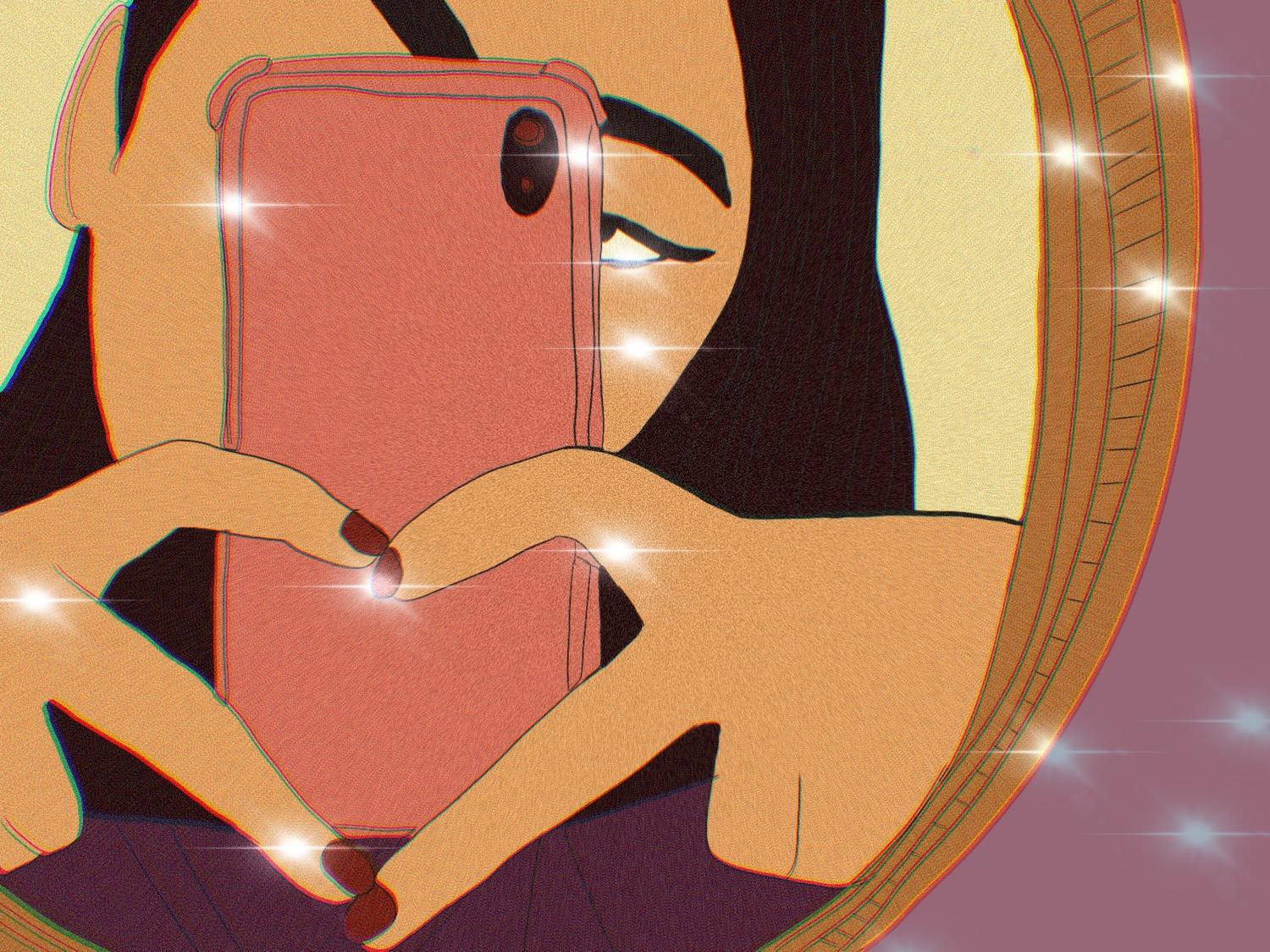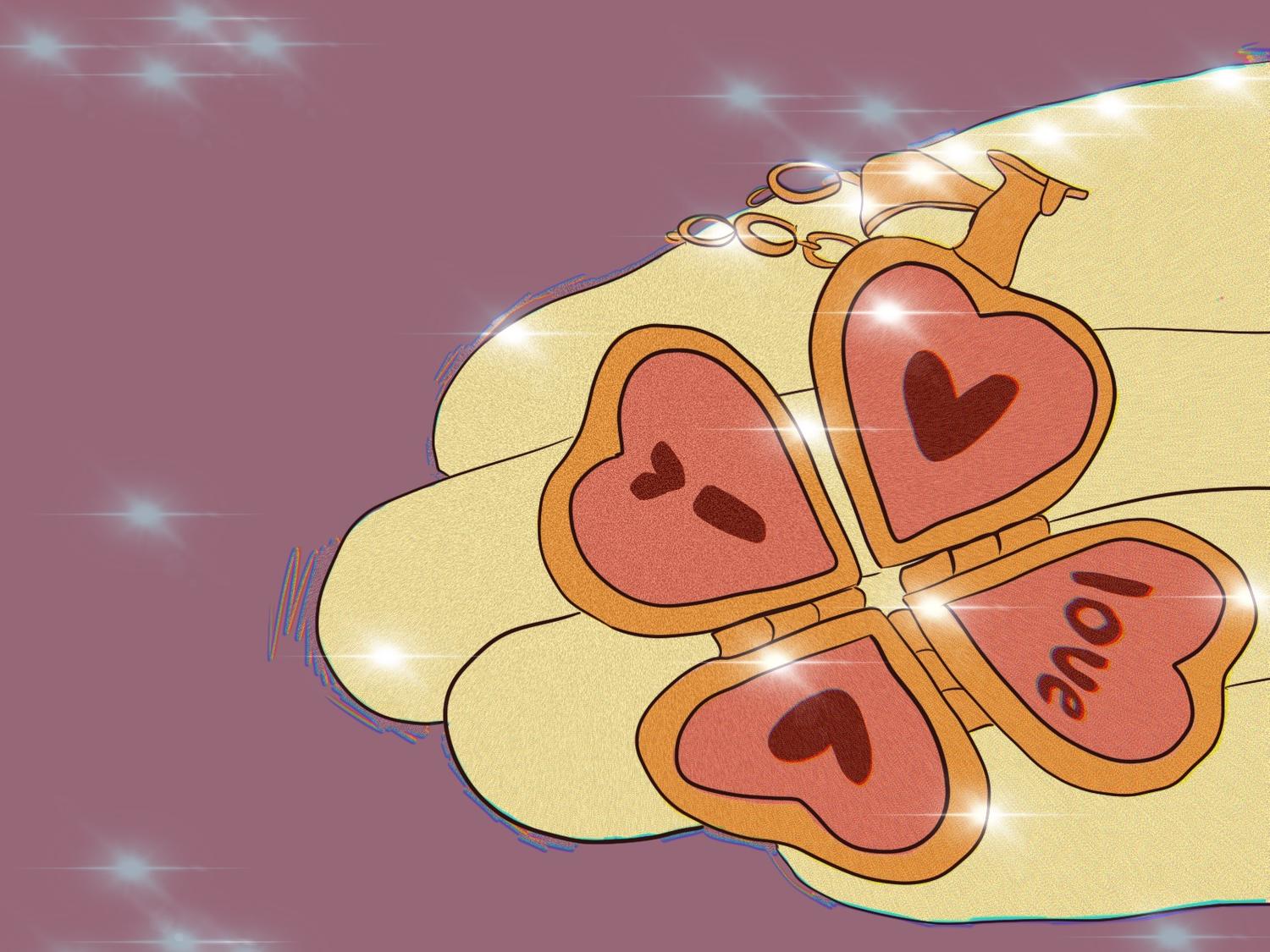Losing Limerence
May 3, 2022

Graphic by Amanda Garza
Limerence (n.) - the state of being infatuated or obsessed with another person, typically experienced involuntarily and characterized by a strong desire for reciprocation of one's feelings.
The first time I heard the definition of limerence, I was in public. Sitting outside my favorite North Austin coffee shop, I discovered the term through a faceless profile hiding in the comments section of Yves Tumor’s “Limerence” video. I nearly missed it, until the word obsession caught my eye: curiosity got the best of me. I scrolled back. My eyes scanned over the comment, the bitter October air chilling me to the bone. I was exposed.
The experience was doubly humiliating and illuminating: While I didn’t know what it’d meant, I lived with limerence all my life. Since my first real crush, I defined periods of my life by people who didn’t like me. Each one was different, but they all were united in that they simply didn’t like me the way I liked them.
Limerence was my home away from home: a familiar place I always came back to, someplace I felt too comfortable. I lived within the restrictive walls of the House of Limerence like a recluse. Shutters closed, no visitors — just the false expectations of lovers, someone to take me out. I grew up there, I couldn’t walk away.
Coming out as gay in early high school, my options were limited. My straight peers were able to easily engage in romance while I was barred from the experience entirely. Left adrift, I settled into my role as “The Observer”: forced to stare through the thin plexiglass exterior of everyone else’s relationship in hopes that I would find myself reflected back someday. I didn’t let many people in on how awful it felt being supremely alone all the time. Instead, I bottled up the real emotional spectacle — the nitty-gritty of how I really felt — and channeled it into my writing. Yet, despite craving a relationship more than anything else in the world, I seldom liked people.
My “test” in assessing a crush is cutthroat: I have to imagine us sitting on the edge of the Grand Canyon, and if my gut reaction isn’t to want to throw them off or throw myself off to avoid being alone with them, they pass. Symptomatic of crippling Middle Child Syndrome, I’ve always been too independent for my own good. All the time I had spent staying up at night writing in my room gave way to romantic projections that nobody could live up to. It was rare anyone could ever pique my interest.
Yet, every once in a while, someone did.
There were four. I remember all four of the men who ruled my life: how I let them, how little I actually ever knew them at all, and how so much of my love life was a nonexistent narrative I spun to comfort myself in my predisposed loneliness. Limerence became an escape for me. Instead of fixating on my own displeasure, I could ride the dramatic highs and lows that limerence provided.
Will they text back? Oh, they did!
Will they comment on my post? Oh, they just liked it.
Will they finally admit they’ve liked me all along? Oh, they didn’t.
Will they comment on my post? Oh, they just liked it.
Will they finally admit they’ve liked me all along? Oh, they didn’t.
I never really got over any of them, I just moved onto the next person. There was always a next person, someone I hoped to take me away from the dreaded rejection of the last guy. This time, I thought, this time it’ll be different.
It never was. Not even close. It only got worse each time as I engrossed myself more into their personhood. I chose someone more attractive, more unattainable, and their interests always overlaid perfectly with mine. As great as it seemed at the time, as perfect and pristine as I had imagined it must turn out — each time I found myself alone.
I was quick to give them power. I destined to be ruled, to finally relinquish myself to an all-consuming love. For far too long, I was the stoic singleman unbothered by my loveless outer layer. It was delusional, but that’s all I had ever known.
How did I get here?
How did I let someone become my whole world?
When did I lose myself?
How did I let someone become my whole world?
When did I lose myself?
In the night, I quietly reveled in these overpowering thoughts. The romantic projections I made built a house I lived in for a long time, and I decided to move out. Stepping outside the House of Limerence was not a decision I ever thought I would’ve made, but it was one that I needed. My path out of limerence was long overdue, but before I could say that I was healed, I had to make three pit stops.

Graphic by Amanda Garza
A Drive to Austin
As I geared up to drive the three hours from Houston to Austin in the first week of January, I made an untraditional decision. Earlier that morning, I stumbled across a YouTube channel called “Crappy Childhood Fairy.” It’s run by Anna Runkle, a middle-aged guru on Childhood PTSD who teaches her viewers how to heal from obsessive, destructive, or unusual behavior that stemmed from childhood. To my surprise, she had made several videos covering limerence. By the time I left Austin that day, I became engrossed in her videos — her commentary on limerence was the first time I had felt that someone understood me. While I usually drive the familiar route listening to all the albums I’d put off, I decided to finish listening to the episode I was mid-way through.
But I couldn’t stop there. Once that episode finished, another caught my eye, then another, and another, until the entirety of my drive was populated with video after video from the Crappy Childhood Fairy. Each episode struck a chord, for I was confronting feelings that pained me to accept: my obsessive infatuation with the uninterested, my shame in my feelings, my directionless pursuits in dating. She’d read letters from viewers just like me and pointed out their flawed perceptions of how love should be — that love shouldn’t be hard earned and sorely won, that love should not be more painful than it is sweet, and that waiting around for someone you like to “change their mind” isn’t a romantic pursuit — it’s a disabling burden.
Stepping out of my car in Austin, I wasn’t the same man I was back in Houston.
Maybe, it struck me, it doesn’t have to be like this.
The Palm Springs Psychic
Wandering along the main drag of Palm Springs, I poked my head into a nondescript crystal shop sandwiched between two eclectic stores in a Southern California shopping mall. The plain facade of the store juxtaposed its fanciful, vibrant interior, and I stepped inside to find a psychic. I’d never been to one before, and for whatever reason, I was compelled to inquire. The employees informed me he had a vacant spot in his busy schedule, so I took it. I had zero expectations.
There was an instant energy shift the moment I sat across from him. The psychic read me like a book, turning the pages of my life story with his fingers across my palm indentations. A man with whom I shared no details of my life was able to accurately ascertain who I was on a fundamental level, beyond the typical blanket statements of bogus clairvoyants. He sensed my troubled romantic pursuits, the exploitation of my empathy, and my gravitation toward the apathetic and narcissistic.
You love the chase, he told me, but you can’t run anymore.
For a second time, a stranger told me I needed to move on. If it’s so clear to everybody else, why isn’t it clear to me? I deserved better. My squandered love didn’t have a leg to stand on, and I couldn’t keep making excuses for those who crushed it.
A Dining Room Intervention
My loved ones echoed the fairy and psychic. One night around the dinner table of my North Campus apartment, I stumbled into an intervention. Originally, a trusted friend was giving me advice on my love life until my roommate’s opposing input challenged her approach. At odds with one another, they came to unify.
Get out Gabe, they warned me, get out of your head.
Suddenly, they directed their attention onto the real problem: me. My unhealthy relationship with limerence had been a full-blown addiction I hid my entire life. I craved attention, and I would reach out when I was weak and itching for another hit. One response, I convinced myself, that’s all I needed. One more, seriously, I won’t need another. Last one — I promise.
But I always ended up wanting more. I’d think that response wasn’t satisfying enough — the needle didn’t hit the vein right. Stepping back and accepting friendship wasn’t an option then, I’d relapse. My friends posed a mirror to my face that night and revealed who I really was: a love addict. And like any addiction, it wore me down. The image reflecting back at me wasn’t someone I recognized: I was this pathetic excuse for a partner, some desperate attention junkie. It humbled me to realize I was exactly the person I’d feared I would become.
To me, limerence was like a childhood stuffed animal: I cherished it, I couldn’t part from it, and I didn’t have the heart to let it go.
But I need to grow up now.
I’m moving out of the house I built. The House of Limerence isn’t in my name anymore, and I’m leaving it with empty hands. Soon, it’ll all be rubble. I think I’ll like it that way. ■

Graphic by Amanda Garza
Other Stories in Life
© 2025 SPARK. All Rights Reserved.
